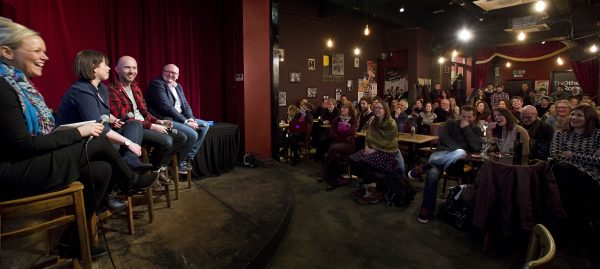Understanding the Creative Economy
8 May 2019
Where does creativity come from and why is it important to the economy, culture and identity of cities? How might we better understand this to shape the future of the city? Since 2014, Cardiff University’s Creative Economy team has been tackling these questions, to better understand, engage and enable the creative economy in this region. Here, Sara Pepper, Director of Creative Economy, Cardiff University considers how creativity enhances quality of life and the economy.

“After being a part of the creative sector for most of my 20-year career, I was asked by Cardiff University colleagues to come in and lead the new team, with a remit to boost connectivity and innovation in the South Wales creative economy.
Since then, South Wales has been part of the UK wide (and indeed global) growth in the creative sector. The creative industries are now the fastest growing part of the UK economy, worth more than £100bn in GVA, with one in every 11 jobs a creative role. In Wales, Welsh Government data indicates that employment in the creative industries grew by close to 95% in the decade between 2006 and 2016.
Much of this is centred in Cardiff – a national creative hub with international reach – projected to be the fastest growing Core City in the UK and one of the UK’s top ten cities for growth in number of businesses. But unlike many other successful creative cities, Cardiff lacked a creative network. After researching best practice across the UK, we established the Creative Cardiff network in 2015.
Creative Cardiff has grown rapidly, and now has 2,500 members spanning the many creative sectors across the city – from architecture to animation, from pottery to post-production in film and TV. The aim of the network is to amplify job opportunities, help make connections between creatives through a series of events and really encourage innovation – especially across different creative sectors.
When we mapped the creative economy – identifying 2,788 creative companies, organisations and freelancers in and around Cardiff – we found that the biggest sector was Music, Performing and Visual Arts, with the proportion of freelancers four times the national employment average. The city was also a becoming a leader in Film and TV production.
This research also cemented my feeling that freelancers really are the backbone of the creative economy. But there was no specific support for this essential, yet often transient, community.
One answer to this came in the formation of a number of creative coworking spaces in the summer of 2016 which all championed the new ways of working. Rabble Studio, Tramshed Tech and the Sustainable Studio quickly grew from their grassroots to major hubs of creative activity that house hundreds of freelancers, micro-businesses and SMEs; places where knowledge and ideas were exchanged, and creative collaborations happened naturally.
With these spaces and a number of others throughout the Cardiff City Region, we have formed the Coworking Collective – an initiative to support those managing these hubs and advocate for productive models of coworking.
Embarking on a career as a creative freelancer or running a start-up business is challenging. We work in partnership with Rabble Studio and the Enterprise team at Cardiff University on the Ymalen! pilot programme, which placed graduates with a creative business idea in the space for six months to develop their proposition. This has resulted in a number of creative graduates now finding their way in the sector and will now be rolled out by the university into other hubs and other sectors.
At Cardiff University innovation is an integral part of the purpose of the organisation’s activity and way of thinking. In 2018 our unit led, and won, a successful bid for Industrial Strategy funding through the highly competitive Creative Industries Cluster Programme.
The new initiative – Clwstwr – is a partnership with University of South Wales and Cardiff Metropolitan University and involves over 50 partnerships. It is an ambitious programme for industry to make innovative new screen-related products, services and experiences.
Clwstwr now works alongside Creative Cardiff working with, and for, the creative economy in South Wales. It is why Creative Cardiff’s founding members range from Cardiff Council to Wales Millennium Centre and BBC Cymru Wales. It is why Clwstwr involves creative and tech companies from news to augmented reality. Together, we believe that we can tell – to the world – a new story about Cardiff as a capital of creativity. Why not come and join us?”